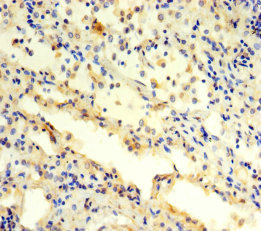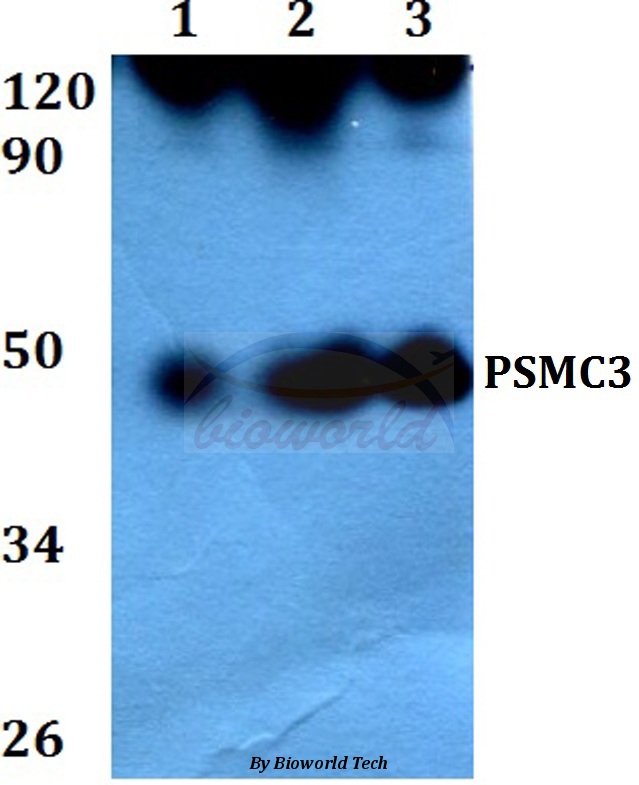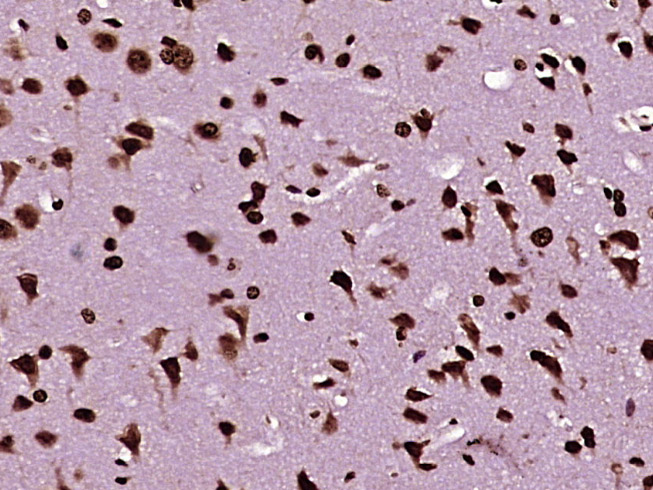![WB analysis of HEK293T cells transfected with PSMC3 plasmid (Right) or empty vector (Left) for 48 hrs using GTX83784 PSMC3 antibody [1C10]. Loading : 5 ug per lane WB analysis of HEK293T cells transfected with PSMC3 plasmid (Right) or empty vector (Left) for 48 hrs using GTX83784 PSMC3 antibody [1C10]. Loading : 5 ug per lane](https://www.genetex.com/upload/website/prouct_img/normal/GTX83784/GTX83784_3903_WB_w_23061420_439.webp)
WB analysis of HEK293T cells transfected with PSMC3 plasmid (Right) or empty vector (Left) for 48 hrs using GTX83784 PSMC3 antibody [1C10]. Loading : 5 ug per lane
PSMC3 antibody [1C10]
GTX83784
ApplicationsImmunoFluorescence, Western Blot, ImmunoCytoChemistry, ImmunoHistoChemistry, ImmunoHistoChemistry Paraffin
Product group Antibodies
ReactivityCanine, Human, Monkey, Rat
TargetPSMC3
Overview
- SupplierGeneTex
- Product NamePSMC3 antibody [1C10]
- Delivery Days Customer9
- Application Supplier NoteWB: 1:2000. ICC/IF: 1:100. IHC-P: 1:50. *Optimal dilutions/concentrations should be determined by the researcher.Not tested in other applications.
- ApplicationsImmunoFluorescence, Western Blot, ImmunoCytoChemistry, ImmunoHistoChemistry, ImmunoHistoChemistry Paraffin
- CertificationResearch Use Only
- ClonalityMonoclonal
- Clone ID1C10
- Concentration0.81 mg/ml
- ConjugateUnconjugated
- Gene ID5702
- Target namePSMC3
- Target descriptionproteasome 26S subunit, ATPase 3
- Target synonymsDCIDP, RPT5, TBP1, 26S proteasome regulatory subunit 6A, 26S protease regulatory subunit 6A, 26S proteasome AAA-ATPase subunit RPT5, Tat-binding protein 1, human immunodeficiency virus tat transactivator binding protein-1, proteasome (prosome, macropain) 26S subunit, ATPase, 3, proteasome subunit P50, testicular secretory protein Li 42
- HostMouse
- IsotypeIgG2a
- Protein IDP17980
- Protein Name26S proteasome regulatory subunit 6A
- Scientific DescriptionThe 26S protease is involved in the ATP-dependent degradation of ubiquitinated proteins. The regulatory (or ATPase) complex confers ATP dependency and substrate specificity to the 26S complex (By similarity). In case of HIV-1 infection, suppresses Tat-mediated transactivation.
- ReactivityCanine, Human, Monkey, Rat
- Storage Instruction-20°C or -80°C,2°C to 8°C
- UNSPSC41116161

![ICC/IF analysis of HepG2 cells using GTX83784 PSMC3 antibody [1C10]. ICC/IF analysis of HepG2 cells using GTX83784 PSMC3 antibody [1C10].](https://www.genetex.com/upload/website/prouct_img/normal/GTX83784/GTX83784_816_ICCIF_w_23061420_388.webp)
![WB analysis of various cell lines using GTX83784 PSMC3 antibody [1C10]. Loading : 35 ug per lane WB analysis of various cell lines using GTX83784 PSMC3 antibody [1C10]. Loading : 35 ug per lane](https://www.genetex.com/upload/website/prouct_img/normal/GTX83784/GTX83784_3904_WB_w_23061420_347.webp)
![IHC-P analysis of human ovary adenocarcinoma tissue using GTX83784 PSMC3 antibody [1C10]. Antigen retrieval : Heat-induced epitope retrieval by 10mM citrate buffer, pH6.0, 100oC for 10min. Dilution : 1:50 IHC-P analysis of human ovary adenocarcinoma tissue using GTX83784 PSMC3 antibody [1C10]. Antigen retrieval : Heat-induced epitope retrieval by 10mM citrate buffer, pH6.0, 100oC for 10min. Dilution : 1:50](https://www.genetex.com/upload/website/prouct_img/normal/GTX83784/GTX83784_1828_IHC-P_w_23061420_271.webp)
![ICC/IF analysis of COS7 cells transiently transfected with PSMC3 plasmid using GTX83784 PSMC3 antibody [1C10]. ICC/IF analysis of COS7 cells transiently transfected with PSMC3 plasmid using GTX83784 PSMC3 antibody [1C10].](https://www.genetex.com/upload/website/prouct_img/normal/GTX83784/GTX83784_815_ICCIF_w_23061420_140.webp)
![IHC-P analysis of kidney tissue using GTX83784 PSMC3 antibody [1C10]. Antigen retrieval : Heat-induced epitope retrieval by 10mM citrate buffer, pH6.0, 100oC for 10min. Dilution : 1:50 IHC-P analysis of kidney tissue using GTX83784 PSMC3 antibody [1C10]. Antigen retrieval : Heat-induced epitope retrieval by 10mM citrate buffer, pH6.0, 100oC for 10min. Dilution : 1:50](https://www.genetex.com/upload/website/prouct_img/normal/GTX83784/GTX83784_1829_IHC-P_w_23061420_669.webp)







![WB analysis of various cell lines using GTX83778 PSMC3 antibody [9F3]. Loading : 35 ug per lane](https://www.genetex.com/upload/website/prouct_img/normal/GTX83778/GTX83778_3901_WB_w_23061420_182.webp)
![ICC/IF analysis of COS7 cells transiently transfected with PSMC3 plasmid using GTX83783 PSMC3 antibody [9G5].](https://www.genetex.com/upload/website/prouct_img/normal/GTX83783/GTX83783_814_ICCIF_w_23061420_879.webp)